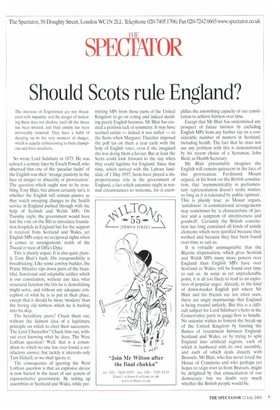Should Scots rule England?
The interests of Englishmen are not threatened with impunity: and the danger of molesting them does not disclose itself till the threat has been uttered, and their enmity has been irrevocably incurred. They have a habit of sleeping up to the very moment of danger, which is equally embarrassing to their champions and their assailants.
So wrote Lord Salisbury in 1873. He was echoed a century later by Enoch Powell, who observed that one of the 'peculiar faults' of the English was their 'strange passivity in the face of danger or absurdity or provocation'. The question which ought now to be troubling Tony Blair, but almost certainly isn't, is whether the English will remain passive as they watch sweeping changes to the health service in England pushed through with the help of Scottish and Welsh MPs. On Tuesday night, the government would have lost the vote on the Bill to introduce foundation hospitals in England but for the support it received from Scotland and Wales, yet English MPs enjoy no reciprocal rights when it comes to arrangements north of the Tweed or west of Offa's Dyke.
This is plainly unjust. It is also quite plainly Tony Blair's fault. His irresponsibility is breathtaking. Like some cowboy builder, the Prime Minister rips down parts of the beautiful, functional and adaptable edifice which is our constitution, without any idea what structural function the bits he is demolishing might serve, and without any adequate conception of what he is to put in their place, except that it should be more 'modern' than the boring old timbers which he is hurling into his skip.
The hereditary peers? Chuck them out, without the faintest idea of a legitimate principle on which to elect their successors. The Lord Chancellor? Chuck him out, without even knowing what he does. The West Lothian question? Well, that is a conundrum to which no one has ever found a satisfactory answer, but luckily it interests only Tam Dalyell, so we shall ignore it.
The consequence of ignoring the West Lothian question is that an explosive device is now buried in the heart of our system of representative government. By setting up assemblies in Scotland and Wales, while per mining MPs from those parts of the United Kingdom to go on voting and indeed deciding purely English business, Mr Blair has created a perilous lack of symmetry. It may have seemed unfair — indeed it was unfair — to the Scots when Margaret Thatcher imposed the poll tax on them a year early with the help of English votes, even if she imagined she was doing them a favour. But at least the Scots could look forward to the day when they could legislate for England. Since that time, which arrived with the Labour landslide of 1 May 1997, Scots have played a disproportionate role in the government of England, a fact which unionists ought in normal circumstances to welcome, for it exem
plifies the astonishing capacity of our constitution to achieve fairness over time.
Except that Mr Blair has undermined any prospect of future fairness by excluding English MPs from any further say on a considerable number of matters in Scotland, including health. The fact that he does not see any problem with this is demonstrated by his recent choice of a Scotsman, John Reid, as Health Secretary.
Mr Blair presumably imagines the English will remain quiescent in the face of this provocation. Ferdinand Mount argued, in his book on the British constitution, that 'asymmetricality in parliamentary representation doesn't really matter, so long as it is tolerated by public opinion'. This is plainly true: as Mount argues, 'untidiness' in constitutional arrangements may sometimes be 'a characteristic of justice and a symptom of attentiveness and goodwill'. Certainly the British constitution has long contained all kinds of untidy elements which were justified because they worked and because they had been found over time to suit us.
It is virtually unimaginable that the Blairite dispensation, which gives Scottish and Welsh MPs many more powers over England than English MPs have over Scotland or Wales, will be found over time to suit us. At some as yet unpredictable point, it is all too likely to lead to an explosion of popular anger. Already, in the kind of down-market English pub where Mr Blair and his friends are not often seen, there are angry murmurings that England is being treated unfairly. But this is a difficult subject for Lord Salisbury's heirs in the Conservative party to gauge how to handle. No unionist wishes to foment the break-up of the United Kingdom by fanning the flames of resentment between England, Scotland and Wales, or by trying to split England into artificial regions, each of which is lumbered with its own assembly, and each of which deals directly with Brussels. Mr Blair, who has never loved the House of Commons and who perhaps yet hopes to reign over us from Brussels, might be delighted by that emasculation of our democracy; but we doubt very much whether the British people would be.


































































 Previous page
Previous page